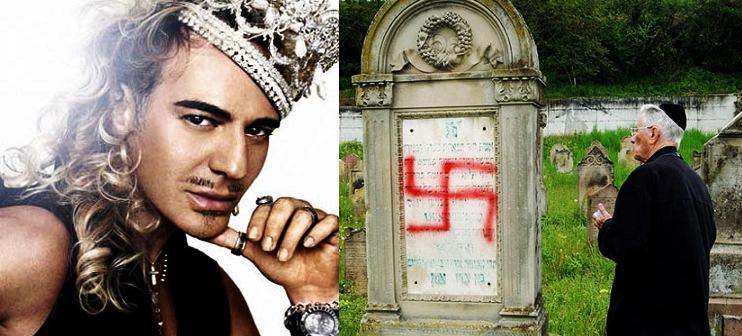The Galliano Affair: Fashion And Racism In 21st Century France

L’enfant terrible of fashion, John Galliano, received a suspended sentence on September 8th for anti-Semitic and racist remarks made at a bar within walking distance of his home in Paris. He might have been better off had he not left under his own power that night as his chauffeur was “trained” to contact a lawyer as soon as the Valium and booze kicked in.
He went to rehab (in America, of course) and expressed regret for “the sadness this whole affair has caused.”
Although incidents were down last year from the alarming peaks of 2009 — 466 incidents last year vs. 822 the year before — French anti-Semitism has been on the rise in recent years. Anti-Semitism in France has a long history and in some ways, Galliano’s comments were more of a sourcils haussés moment than full-on cul par terre. Shocking, but not surprising.
And yet, anti-Semitism in France is at an all time low among the French. French Catholic families now overwhelmingly view French Jews as French [pdf]; the new Others are seen as the Maghrebis, Arabs, and Berbers from the former North African colonies of Morocco, Algeria, Libya, and Tunisia. Even the far-right Front National has been toning down its anti-Jewish rhetoric lately, and Marinne Le Pen, their current leader, is actively courting French Jews to join the Front’s crusade against Arab and Berber immigrants. All of which is made more bizarre by the fact that Le Pen’s father, Jean-Marie, is Godfather to Plume M’bala M’bala, the third daughter of activist Dieudonné M’bala M’bala who began his career fighting for the cause of the sans papiers, the undocumented Maghrebis.

It is now these recent immigrants who bear the brunt of French xenophobia and marginalization. They live exiled to miserable housing blocks in the suburbs of the larger cities such as Marseilles, Toulouse, and Paris. When two youths, Zyed Benna and Bouna Traoré, died of electrocution after allegedly trying to escape police harassment by hiding in a power substation on October 27, 2005, rioting broke out which eventually spread to every one of France’s 15 major metropolitan areas. President Chirac declared a state of emergency on November 8th, which was not lifted until January 4th of the following year. Almost 3,000 were arrested during the turmoil, the majority of which were North African.
Muslims in France today are the preferred target of French bigotry. The country has outlawed the burqa and niqab in public to combat the great security risk posed by the 400 or so women who wear them, although a motorcycle helmet with visor or a balaclava is still acceptable for the other 64,000,000 residents of France. Not that the Maghrebis have ever been welcomed with open arms. On October 17th, 1961 (the Nuit Noire) some 30,000 peaceful protesters gathered illegally to voice support for the Algerian resistance movement, FLN, against the French colonial forces. That night, under orders from the head of the police, as many as 200 of the protestors were massacred by police officers, their bodies dumped in the Seine. To this day, only 40 of the deaths have been officially acknowledged by the government, though in 2001 there was a memorial plaque affixed to the Saint-Michel bridge.
Hate, hate speech, and hate crimes in France are complicated, nuanced, and incredibly subjective. While French Jews are now widely accepted and present in public life, the Maghrebis have filled that void: “48% of people viewing Muslims constituting a group separate from wider French society (up 4% over 2009), and 68% believing the wearing of the Islamic veil by women may pose problems to social harmony. Elsewhere the poll found 56% of people stating there are too many immigrants in France (up 9% from 2009), and 61% of those respondents saying the presence of foreigners made their lives more difficult. Another 67% said they believe many immigrants come to France exclusively to obtain welfare state privileges.” So mainstream is French anti-Muslim sentiment that President Sarkozy has integrated elements of it into his reelection platform.
The irony in Galliano’s case is that he seems to have not kept up with which hate was acceptable. He (or his drunken id) seems to have seen himself as an aristocrat going after the lowest of the low, (he described the woman’s boots as “cheap”) without realizing that as a Spaniard raised in Britain, attacking a juive was to lower himself to the status of Other.
Less l’enfant terrible than el niño triste.
Aine Farrell lives and writes in Baltimore, MD. She is obsessed with all things political, issues of social justice, and cultural memes. She once cooked Julia Child a chicken, which was well-received.









